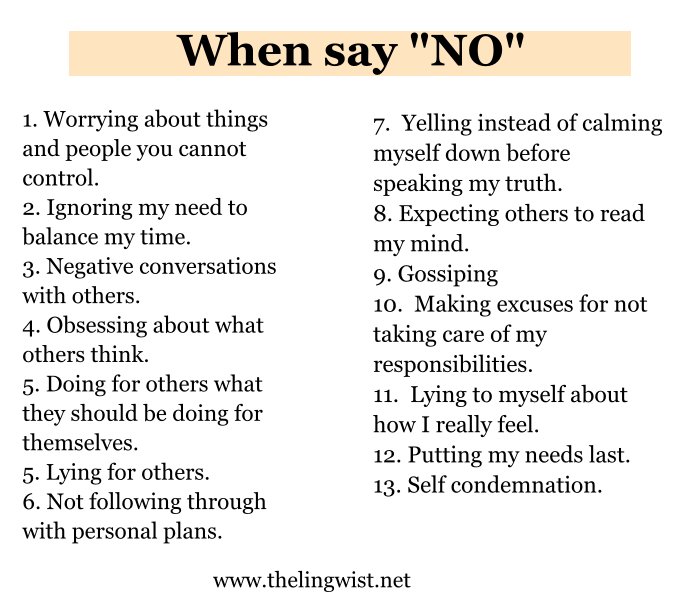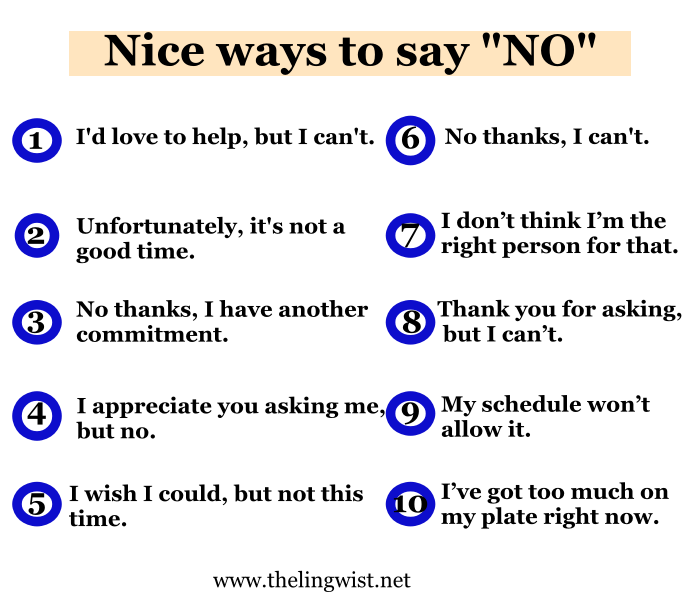Stop saying “yes” when you mean “no”. If you don’t say no to some requests, then you are overburdening yourself. In a finite world, you have a lot to do. You have to arrange your priorities and the most important things. If you keep saying yes to everything, you will end up just doing others’ task
Thank you for reading this post, don't forget to subscribe!Well, it’s time to break out of that shy shell and learn how to politely decline with confidence!
1. So how do we say no no no without being rude? Say “NO”
As long as you don’t do it poorly and rudely, then you have every right to say “no” and big “no” when you feel you want to.
2. When to say “No”

3. Expressions to say “No” Nicely

4. Tips on how to say “No”
1- Use the word “no”
Don’t use sentences like “Not now”, “I’m not sure”, “Okay I’ll see”, but say “No” because it has a stronger and more powerful effect. Say “No” when you are sure you can’t make this request, and don’t apologize for saying “No” And practice saying it until you lose its power and you can use it without feeling that you can’t pronounce it.
2- Don’t justify too much.
This applies when interacting with your parents, friends, or even your boss. Do not lie or justify at length and state your personal reasons in detail. Just say that you do not want to do this.

You should stop it
3- You can use because
There are cases in which you must mention your reasons so that others stop their excessive insistence. State your reasons without going into much detail.
4- Do not be ashamed to say “No” twice
Some people think that when they insist, they can get what they ask, or that they will make you feel embarrassed and agree to their request. Smile and politely say “No” again but more formally and assertively.
Read Also – 10 best memes and puns to make you Laugh
5- Say “No” firmly
This helps you to feel that you are the person in control of the situation and not the other way around. Make direct eye contact and speak clearly and firmly and do not feel hesitant. This will help you a lot when you feel that others are trying to take advantage of you.
6. Do not accept or take free things
Some try to wrap the ropes around your neck to use you for their own benefit, so they do you a favor in order to use you later. If you feel that way, decline their favors and avoid their services.
7- Ask yourself: “Is it worth saying Yes“?
In the workplace, do not always do anything for free. Once you say ” yes”, make sure it is the right moment.
8- Trust your intuition
Your intuition sometimes leads you if you are lost, so if you are not sure, do not take risks and just say (No).
9- Change your mind
Just because you say (yes) to someone does not mean that you will always agree, say no to what you think you can’t stand.
10- Don’t over apologize
Over use of “I’m sorry” or “I’m sorry” makes you look weak, you can say (I’d like it but I can’t).
Read Also – 10 best memes and puns to make you Laugh







